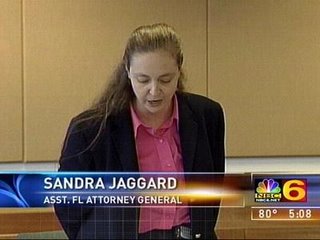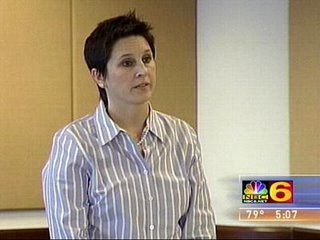http://www.angel-diaz.us/legal/Motionforrel.htmhttp://www.angel-diaz.us/legal/Filed_11-27-2006_MotionRelinquishment.pdf - PDF
IN THE SUPREME COURT OF FLORIDA
NO. SC68493
EMERGENCY CAPITAL CASE, DEATH WARRANT SIGNED;
EXECUTION SCHEDULED FOR DECEMBER 13, 2006 AT 6:00 P.M.
ANGEL NIEVES DIAZ,
Appellant,
v.
STATE OF FLORIDA,
Appellee.
__________________________/
MOTION FOR RELINQUISHMENT AND/OR FOR CLARIFICATION OF HOW
TO PROCEED
COMES NOW THE APPELLANT, ANGEL NIEVES DIAZ, by and
through his undersigned counsel, and herein moves for a relinquishment to the lower
court in light of the circumstances alleged below and/or for clarification of how to
proceed.
1. On November 19, 2006, counsel's investigator interviewed Ralph Gajus, the
jailhouse snitch that testified against Mr. Diaz, and Mr. Gajus has now provided a sworn
affidavit that his testimony at Mr. Diaz’s trial was untrue.
AFFIDAVIT OF RALPH GAJUS
I, Ralph Gajus, being first duly sworn, depose and say that:
1. In 1984 I was inmate in the Dade County Jail awaiting trial on a
first degree murder charge. I was in the jail with Angel Diaz for 6
months. We were on the 6th floor on a wing with 6 cells. Angel Diaz
was in the cell directly across from me and we would speak to each
other across the hall from each other..2. Angel Diaz spoke English with a very thick accent and used
simple words. I sometimes had a hard time understanding Angel
Diaz. I did not speak any Spanish. We would communicate by using
our hands and with Angel Diaz's broken English. We also would
write notes to each other.
3. We would always talk about each other cases. I told him about
mine and he always talked about his. Angel Diaz told me about a
robbery at a bar with two other guys and amid the commotion a man
was shot. Angel Diaz acted out the shooting using his hands. I do not
know what really happened or whether Angel Diaz did the shooting.
Angel Diaz never told me that he shot anyone.
4. During this time, Angel Diaz and I also talked about planning an
escape. We passed notes among the inmates to plan the escape.
Before the escape took place I read a note from Angel Diaz to
another inmate and I believed I was going to be in danger during the
escape. I asked the jail guards to move me and told the jail about the
escape plan. I was angry with Angel Diaz because I found out they
were not going to take me and I believed I was in danger.
5. After I was moved and told the jail about the escape Detective
Smith and another officer came to talk to me about Angel Diaz.
When the detective spoke to me about Angel Diaz's case I asked
them to help me out with my case. They told me they would make a
statement for me to the Judge.
6. I testified at Angel Diaz's trial that Angel Diaz acted out the
shooting and that he shot the man. I testified that Angel Diaz was the
shooter. At that time I testified I was unsure who really was the
shooter because Angel Diaz never told me and when he acted out the
shooting it was very unclear. I testified that I believed that Angel
Diaz was the shooter because I was angry about the escape plan and
I believed that the police were going to help me with my case.
7. I plead guilty to second degree murder in August or September
1985 and was sentenced in 1986. I recall that Detective Smith
testified at
my sentencing that I helped with the escape and that I helped in their
case against Angel Diaz. I was sentenced to 20 years with a three
year mandatory.
FURTHER AFFIANT SAYETH NAUGHT./s/ Ralph Gajus
2. Based on this affidavit, counsel began investigating whether Mr.
Diaz had a viable claim based on newly discovered evidence. Fla. R. Crim. P.
3.851 (e)(2) requires:
A motion filed under this rule is successive if a state court has
previously ruled on a ostconviction motion challenging the same judgment
and sentence. A successive motion shall not exceed 25 pages, exclusive of
attachments, and shall include:
(A) all of the pleading requirements of an initial motion under
subdivision (e)(1);
(B) the disposition of all previous claims raised in postconviction
proceedings and the reason or reasons theclaim or claims raised in the
present motion were not raised in the former motion or motions;
(C) if based upon newly discovered evidence, Brady v. Maryland, 373
U.S. 83 (1963), or Giglio v. United States, 405 U.S. 150 (1972), the
following:
(i) the names, addresses, and telephone numbers of all
witnesses supporting the claim;
(ii) a statement that the witness will be available, should an
evidentiary hearing be scheduled, to testify under oath to the facts
alleged in the motion or affidavit;
(iii) if evidentiary support is in the form of documents, copies
of all documents shall be attached, including any affidavits
obtained; and
(iv) as to any witness or document listed in the motion or
attachment to the motion, a statement of the reason why the
witness or document was not previously available.
Furthermore, in order to constitute "newly discovered evidence," Mr. Diaz bears the
burden of proving the evidence was not discoverable through due diligence and that, if
discovered and introduced at trial, would have "probably produced an acquittal."
Swafford v. State, 679 So. 2d 736 (Fla. 1996)..3. To meet the first threshold of diligence and the pleading requirements of
Rule 3.851, it was necessary for counsel to find attorneys who worked on Mr. Diaz’s case
almost 20 years ago. Counsel was unable to obtain affidavits from the necessary
witnesses to diligence until November 27, 2006.
4. In the interim, on November 21, 2006 the lower court denied all
pending motions and Mr. Diaz diligently filed his appeal to this Court on
November 21, 2006.
5. Mr. Diaz is seeking clarification at this time in light of the unique
circumstances and time constraints. Mr. Diaz contends that this affidavit requires an
evidentiary hearing. However, the lower court has lost jurisdiction.
6. At this point, Mr. Diaz is asking for a relinquishment to amend his Rule
3.851 motion based on the newly discovered evidence. A copy of the amendment for
which Mr. Diaz seeks relinquishment is attached hereto. In the alternative, Mr. Diaz
seeks clarification on how to proceed. This information is new, and Mr. Diaz's brief is
due by 3:00 pm on November 30, 2006. It is not appropriate to raise new issues for the
first time on appeal; however, these are unique circumstances and time constraints are
pressing. If the Court wishes Mr. Diaz to brief these issues, then he will do so. If the
Court wishes to relinquish jurisdiction so that Mr. Diaz can amend his motion or file a
successive motion, then he will do so. See State v. Meneses, 392 So. 2d 905 (Fla. 1981).
At this point, the lower court has no jurisdiction.
WHEREFORE Mr. Diaz requests (1) a relinquishment to the lower court to
permit Mr. Diaz to amend his 3.850 motion with this newly discovered and disclosed.information; (2) should the Court decline to relinquish, then Mr. Mills seeks clarification
on whether to include this information in his brief or how to proceed at this point.
CERTIFICATE OF SERVICE
I HEREBY CERTIFY that a true copy of the foregoing has been furnished by US
Mail to Hon. Amy Steele Donner, 175 N.W. 1 st Ave., Ste. 2314, Miami, FL 33128,
Sandra Jaggard, Assistant Attorney General, 444 Brickell Ave., Suite 650 Miami, Florida
33131, Penny Brill, Assistant State Attorney, 1350 N.W. 12 Avenue, Miami, Florida
33125 this ___ day of ____________ 2006.
___________________________
SUZANNE MYERS KEFFER
Assistant CCRC
Florida Bar No. 0150177
BARBARA L. COSTA
Staff Attorney
Florida Bar No. 0014244
Capital Collateral Regional
Counsel - South
101 NE Third Avenue, Suite 400
Ft. Lauderdale, FL 33301
(954) 713-1284
Counsel for Defendant





